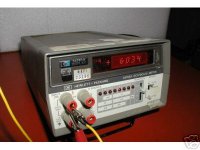Just about to buy a new DMM to replace my rather crappy current one.
But what kind of accuracy should i be looking for in a DMM?
I grasp the 'as great an accuracy as you can afford' concept...but that would mean buying something seriously expensive and most likely comlete overkill.
So what would do fine for amp building?
Cheers,
WB
But what kind of accuracy should i be looking for in a DMM?
I grasp the 'as great an accuracy as you can afford' concept...but that would mean buying something seriously expensive and most likely comlete overkill.
So what would do fine for amp building?
Cheers,
WB
Sch3mat1c said:The most precise component you have in circuit might be 1 or 5% (being the resistors), and I imagine most DMMs are at least that precise, so don't worry about it. It is a poorly designed circuit to need even that much precision anyway!
Tim
I disagree with the previous post - the accuracy of the meter you buy should depend wholy on your intended purpose. The tolerance rating of a resistor only tells how far it will deviate from it's rating and not dictate how accurately you want to measure the voltage across or current passing through it.
You should ask yourself the question, "what is the allowable tolerance of any readings I will make?" - if you are working in a medical or military field then a DMM may have to be incredibly accurate (and high tolerance) for it's intended purpose, if you are only making simple circuit measurements on audio equipment then obviously lower accuracy and lower tolerances are acceptable.
Magura said:Just make sure its able to measure true RMS, it comes in handy when working on power supplies.
Magura
That's overrated I think, at least if you have a scope. Without
a scope, perhaps, but if you cannot see the waveform anyway...
annex666 said:I agree - often true RMS can be calculated with the appropriate correction factor.
True, but RMS measuring ability dosnt have to make the DMM more expensive, its just nice to have, hence the advice.
Magura
True RMS isn't always "true" --Magura said:Just make sure its able to measure true RMS, it comes in handy when working on power supplies.
Magura
a great DMM, if you care to work EBAY is the Hewlett Packard HP3403C -- this is perhaps the most acurate A.C. reading meter and can perform a variety of functions -- and they usually go for less than $50. Of course, this is a bench-type meter, not a hand-held, but a terrific bargain if you are have to measure a.c. or noise. Sorry, no resistance or current measurements, just volts!
the HP3478 is also an excellent true RMS reading meter, but these are more expensive, around $100 to $250. It's almost a lab-grade meter.
The Fluke 187 is True RMS + DC and has a bandwidth to about 100kHz. But the price runs about US$350 new, which has kept me from buying it since my previous True RMS meter ($100 RS model from 1997) started to flake out more than a year ago....
I'm told that less expensive functional equivalents to the Fluke 187 exist, but I don't know of any off the top of my head.
I'm told that less expensive functional equivalents to the Fluke 187 exist, but I don't know of any off the top of my head.
for some reason there are a lot of HP 3456A meters for sale -- less than $100 -- this is a lab grade meter, 4 wire ohms etc -- it takes up a lot of space, but is an excellent high quality device:
here's a nice HP 34703A with a "buy it now" price of $35 -- and it's checked out:
here's a nice HP 34703A with a "buy it now" price of $35 -- and it's checked out:
Attachments
Anything , I would say. Just state your budget and we can recommend it or not.waben said:So what would do fine for amp building?
Write down all you wanted features first. It can help.
I have Fluke 77 a really good instrument which draws very little battery. Battery change once a year. I have also APPA305 a really good instrument and accurate (according to my calibration service) but it sucks 10 times the current of the Fluke! APPA is also rather slow when it comes to switching ranges, rather irritating. Fluke a
 in that department. APPA has also no memory, irritating! Lot's of pros and cons.
in that department. APPA has also no memory, irritating! Lot's of pros and cons.To save a few bucks if you are indeed after a simple hobby-oriented meter, you can try what I did, which was buy a cheapo out of the back of an electronics magazine. I don't know who made it; it's a commodity 3-1/2 digit carrying the badge of the mail-order store, but it has taken more than its fair share of abuse and still works perfectly.
- Status
- This old topic is closed. If you want to reopen this topic, contact a moderator using the "Report Post" button.
- Home
- General Interest
- Everything Else
- DMM, what accuracy should i be looking for
